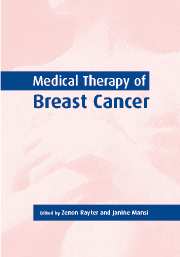Book contents
- Frontmatter
- Contents
- List of contributors
- 1 History of breast cancer therapy
- 2 Chemoprevention of breast cancer
- 3 Familial breast cancer
- 4 Hormone replacement therapy and breast cancer
- 5 Screening for breast cancer
- 6 The management of in situ breast cancer
- 7 Adjuvant systemic therapy
- 8 Adjuvant radiotherapy in the management of breast cancer
- 9 Predictors of response and resistance to medical therapy
- 10 Primary medical therapy in breast cancer
- 11 Medical therapy of advanced disease
- 12 Experimental approaches
- 13 The place of bisphosphonates in the management of breast cancer
- 14 Palliative care in breast cancer
- Index
11 - Medical therapy of advanced disease
Published online by Cambridge University Press: 06 January 2010
- Frontmatter
- Contents
- List of contributors
- 1 History of breast cancer therapy
- 2 Chemoprevention of breast cancer
- 3 Familial breast cancer
- 4 Hormone replacement therapy and breast cancer
- 5 Screening for breast cancer
- 6 The management of in situ breast cancer
- 7 Adjuvant systemic therapy
- 8 Adjuvant radiotherapy in the management of breast cancer
- 9 Predictors of response and resistance to medical therapy
- 10 Primary medical therapy in breast cancer
- 11 Medical therapy of advanced disease
- 12 Experimental approaches
- 13 The place of bisphosphonates in the management of breast cancer
- 14 Palliative care in breast cancer
- Index
Summary
Introduction
Despite advances in the diagnosis and treatment of early breast cancer, approximately a third of patients still die from advanced breast cancer following the development of metastatic disease. Median survival from the time of metastasis is approximately 3 years (Harris et al., 1997), but some patients may have a protracted clinical course over many years, partly because of biological diversity with the disease itself behaving in an indolent fashion, and also because of the sensitivity to endocrine manipulation for some women with advanced breast cancer. The management of advanced breast cancer is a major health problem for two reasons: first because of the relatively long survival, which results in a high prevalence at just over 100 000 cases per annum, and secondly because of the nature of metastatic disease, with problems such as bone metastases, which result in high use of health resources. Breast cancer is a major consumer of resources within any healthcare system. A recent Canadian study modelled the life time costs of treating breast cancer and indicated that while 8% of overall costs are associated with metastatic disease, 16% of costs were due to ongoing care, with the average cost per case of metastatic disease being $36 340 Canadian (£16 500 sterling). This is a Canadian study and therefore cannot be viewed as a direct proxy for the UK. However, a UK study (Richards et al., 1992) also indicated that care costs were the main component of cost rather than drug costs.
- Type
- Chapter
- Information
- Medical Therapy of Breast Cancer , pp. 283 - 308Publisher: Cambridge University PressPrint publication year: 2003
- 2
- Cited by



